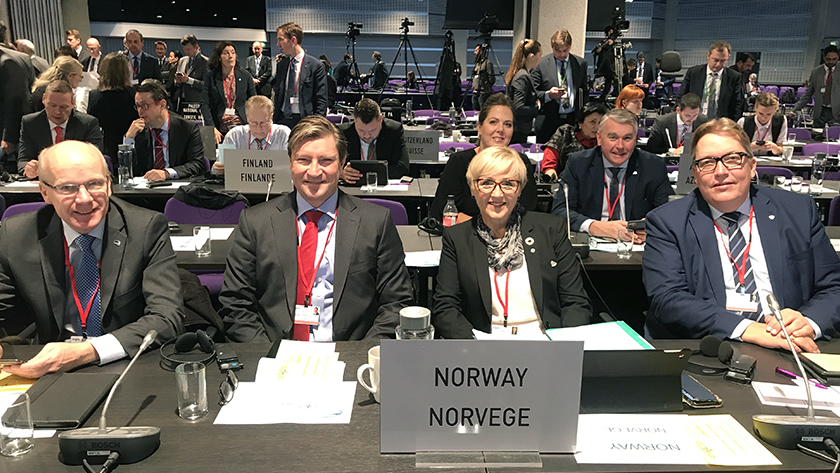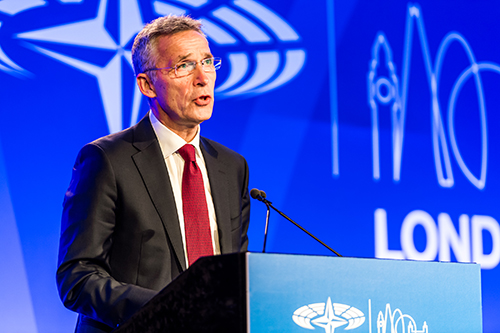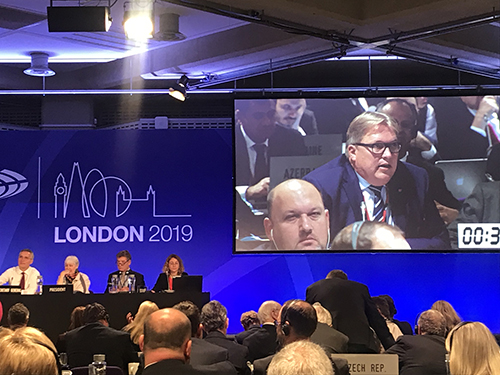
The Storting is well represented. Front row from left: Hårek Elvenes, Christian Tybring-Gjedde, Liv Signe Navarsete and Sverre Myrli. Second row from left: Lene C. Westgaard-Halle and Trond Helleland. Photo: Storting.
NATO PA holds autumn session in London
The NATO Parliamentary Assembly (NATO PA) held its annual session in London from 11–14 October. The Storting’s Delegation to the NATO PA participated.
Representing Norway’s parliament, the Storting, were Head of Delegation Christian Tybring-Gjedde (Progress Party), Deputy Head Liv Signe Navarsete (Centre Party), Sverre Myrli (Labour Party), Trond Helleland (Conservative Party), Lene C. Westgaard-Halle (Conservative Party) and Hårek Elvenes (Conservative Party).
Decisions on nuclear deterrence, cyber security, Afghanistan, Africa
A variety of reports, resolutions and security policy issues are addressed at annual sessions of the NATO PA. During the London session, resolutions were adopted on topics including nuclear deterrence, cyber security, the difficult situation in Afghanistan and security challenges emanating from Africa. A report on security in the far north was also discussed and approved by the assembly. The ramifications of the collapse of the Intermediate-Range Nuclear Forces Treaty was another important issue discussed.

NATO Secretary General Jens Stoltenberg answered questions from NATO parliamentarians in the midst of a demanding time for the alliance. Photo: NATO PA.
“NATO PA meetings provide a wealth of opportunities for updates on security challenges. They also allow us to become personally acquainted with parliamentarians from all the alliance’s member countries. While it might sound a little clichéd to say it, there is no doubt that this strengthens unity within the alliance,” says Head of Delegation Christian Tybring-Gjedde.
Secretary General Stoltenberg takes questions
NATO Secretary General Jens Stoltenberg was among participants in the plenary session on Monday, 14 October. In accordance with tradition the Secretary General answered a wide range of questions posed by the national delegations. Several delegations strongly criticised Turkey’s military action against the Kurds in northern Syria, and Mr Stoltenberg said he was deeply concerned about the situation.
“There is no doubt that Turkey’s military action in northern Syria is a major test for the alliance,” says Mr Tybring-Gjedde. “Discussions on other topics, including the use of economic sanctions, also show a variety of different views and interests in the alliance. A parliamentary assembly may be a good place to bring such disagreements into the light, so we can try to moderate them.”

Sverre Myrli (Labour Party) asked Mr Stoltenberg about his views on China’s rise. Photo: Storting.
Sverre Myrli asked Secretary General Stoltenberg about NATO’s views on the rise of China.
“Given our alliance membership we of course are very focused on what’s happening in the United States and Russia. But we now see that China, too, is becoming a major player not only economically and industrially, but also in the realm of security policy. It was good to be reassured that NATO’s Secretary General is very alert to this,” says Mr Myrli.